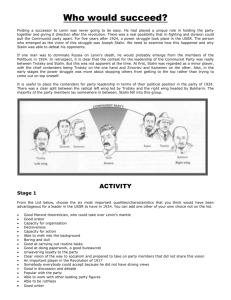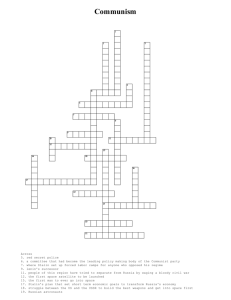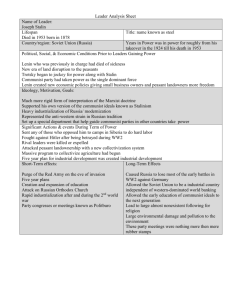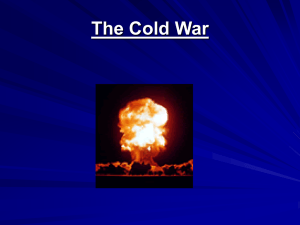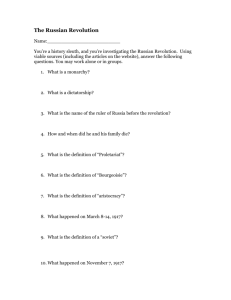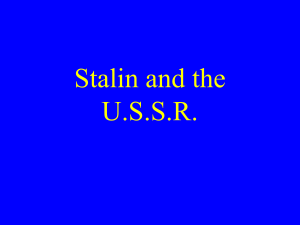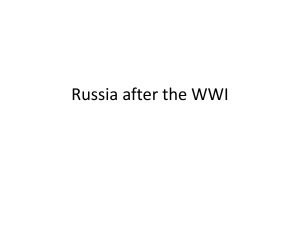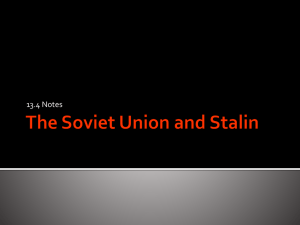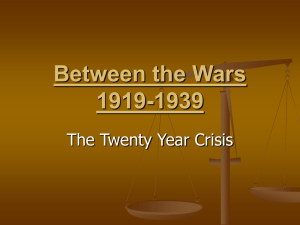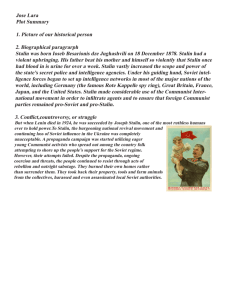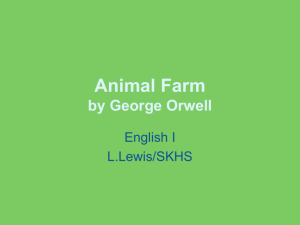The Russian Revolution
advertisement
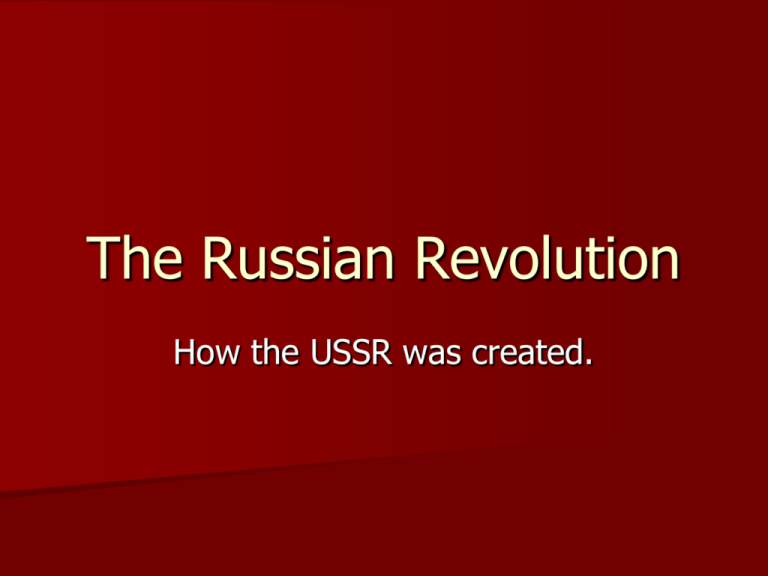
The Russian Revolution How the USSR was created. Russia Very large country. Location: Eastern Europe and Northern Asia 1900 Tsar Nicolas II Of the “Romanov” family. The last “emperor” of Russia. He had very little experience of government and was portrayed as a failure He was thought of as weak and contradicting World War I 1914 -1917 Russia suffers horribly. The poor resent the rule of the rich Romanov family. Outdated economy – Farms – Railways not developed February 1917 Revolution Protests & strikes against the war and food shortages in Petrograd (St. Petersburg). Turns violent, eventually police & soldiers join with strikers. Tsar Nicolas II steps down. Provisional government is set up. Communism Karl Marx German philosopher, political scientist Writes “The Communist Manifesto” The workers own the factory or farm “communally.” The opposite of capitalism. Revolutionaries Split into 2 Groups Mensheviks (minority) Bolsheviks (majority) Led by a talented debater, brilliant organizer, named Vladimir Ulyanov a.k.a. Vladimir Lenin Communism in Russia Lenin Leader of the “Bolshevik” party Trotsky Leon Trotsky Educated Powerful speaker Lost the power struggle. Stalin exiled Trotsky and his family from Russia. Finally had him killed in Mexico. October 1917 Revolution Lenin leads the Bolsheviks to oust the provisional government & take over. Trotsky leads Bolsheviks in St. Petersburg. Create the USSR – The Union of Soviet Socialist Republics Capital is moved to Moscow. The USSR Tsar Nicolas II and his family are murdered July 1918. Lenin dies 1924. Power struggle between Trotsky & Stalin. Stalin wins. Josef Stalin (1879-1953) Described as ruthless Wanted to make Russia a modern industrial power. Believed in collectivization: the belief that all land, means of production, and distribution of such should be left up to the government. Stalin’s “Great Purge” Stalin gets rid of all competition. Stalin executes all of the other leaders of the October 1917 revolution. Trotsky is exiled and eventually assassinated in 1940. Stalin’s rule, continued Propaganda and censors. They literally re-write history. Stalin’s 5-year plan Farms are “collectivized” to finance new industry. Must meet a gov’t quota. Starvation in the Ukraine section of the USSR. Between executions & starvation Stalin is responsible for several million deaths. USSR The USSR was lead by the Communist Party until 1989. -ISMS Socialism: You have 2 cows. Give 1 cow to your neighbor. Communism: You have 2 cows. Give both cows to the government, and they may give you some of the milk. Fascism: You have 2 cows. You give all of the milk to the government, and the government sells it. Nazism: You have 2 cows. The government shoots you and takes both cows. Anarchism: You have 2 cows. Keep both of the cows, shoot the government agent, and steal another cow. Capitalism: You have 2 cows. Sell one cow and buy a bull. Surrealism: You have 2 giraffes. The government makes you take harmonic lessons. Other Russian terms you should know Pravda: the official propaganda tool of the Communist Party. Propaganda: language or advertising that tries to persuade you to do something/change “The Internationale”: the Communist national anthem. Kremlin: the official headquarters of the party. KGB: the secret police Why are we discussing this? Animal Farm = USSR Mr. Jones - Tzar Nicholas II Old Major = Marx/Lenin Snowball = Trotsky Napoleon = Stalin The pigs = The Communist Party Boxer & the animals = the workers of Russia Dogs = KGB/Secret Police Animal Farm by George Orwell An allegory illustrating the way Stalin betrayed the principals of the Russian Revolution. George Orwell is campaigning against Stalin’s Totalitarian government. Written in 1944, during WWII, when the UK and USA allied with Stalin to defeat Hitler. TERMS Allegory - a story in which the characters, setting and events stand for abstract or moral concepts Fable – a short mean to teach a moral – usually uses animals Utopia – an ideal society or perfect existence for man or earth Terms (cont) Totalitarianism – government in which one political party aims at total control over people – Organized violence or police terror – force used to crush opposition – Censorship – only official versions of information are allowed – State control over individual - demanding everyone unquestionably loyal to state – Single strong leader – glorified or deified. Elevated to god-like status – State control over society - business, education, family, housing, religion – Ideology of state – glorified aims of state used to justify everything – Dictatorship – one party rules with absolute control Is it still relevant today? You decide.
